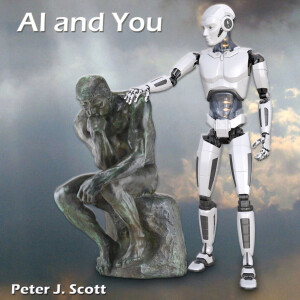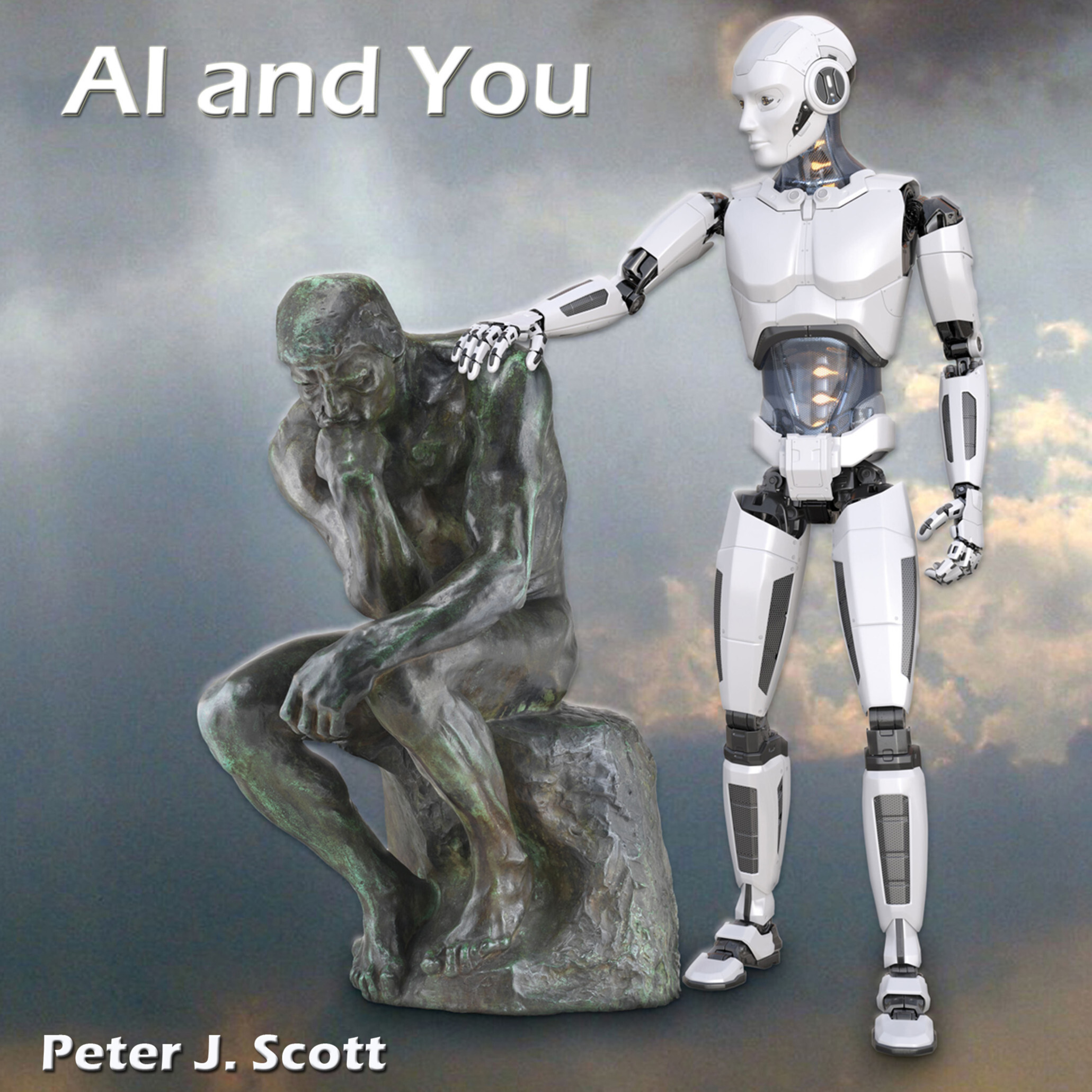Episodes

4 days ago
4 days ago
This and all episodes at: https://aiandyou.net/ .
|
What’s going on with getting AI education into America’s classrooms? We're finding out from Jeff Riley, former Commissioner of Education for the state of Massachusetts and founder of a new organization – Day of AI, started by MIT’s Responsible AI for Social Empowerment and Education institute. And they are mounting a campaign called Responsible AI for America’s Youth, which is now running across all 50 states and will run an event called America’s Youth AI Festival in July 2026 in Boston. Jeff has got master’s degrees from Johns Hopkins and Harvard. He was a Boston school principal and as commissioner, successfully navigated Massachusetts schools through Covid and other crises. In our conclusion, we talk about how Jeff sees the AI education of teachers evolving, responsible use of AI by students, differentiated learning, making AI in classrooms safe for teachers and students, the impact of AI on educational inequalities, the future of educational reform, and how you can get involved in AI in schools. All this plus our usual look at today's AI headlines. Transcript and URLs referenced at HumanCusp Blog. |
 |

Monday Jan 05, 2026
290 - Guest: Jeff Riley, Former Commissioner of Education, part 1
Monday Jan 05, 2026
Monday Jan 05, 2026
This and all episodes at: https://aiandyou.net/ .
|
What’s going on with getting AI education into America’s classrooms? We’re going to find out from Jeff Riley, former Commissioner of Education for the state of Massachusetts and founder of a new organization – Day of AI, started by MIT’s Responsible AI for Social Empowerment and Education institute. And they are mounting a campaign called Responsible AI for America’s Youth, which is now running across all 50 states and will run an event called America’s Youth AI Festival in July 2026 in Boston. Jeff has got master’s degrees from Johns Hopkins and Harvard. He was a Boston school principal and as commissioner, successfully navigated Massachusetts schools through Covid and other crises. We talk about what the campaign is doing and how teachers are responding to it, risks of AI and social media to kids, what to do about cheating and AI detectors, and much more! All this plus our usual look at today's AI headlines. Transcript and URLs referenced at HumanCusp Blog. |
 |

Monday Dec 29, 2025
289 - Special Panel: AI 2025 Retrospective/2026 Predictions
Monday Dec 29, 2025
Monday Dec 29, 2025
This and all episodes at: https://aiandyou.net/ .
|
It's that time to visit the - ghosts? - of AI past, present, and future, in our traditional retrospective/predictions episode. Forming the panel are Dan Turchin, CEO of PeopleReign, the AI platform automating HR and host of the “AI and the Future of Work” podcast. And Richard Foster-Fletcher, the Founder and Executive Chair of MKAI, the inclusive Artificial Intelligence Community, and leader of the MKAI Centre for Digital Trust and host of the Boundless podcast. Both have been on the show before, as guest experts and year-end panelists, and both are good friends. We'll talk about surprises from 2025, ways companies have used AI productively and ways it has been oversold, whether an AI bubble may pop next year, what'll happen next with AI slop, and how much AI may advance human progress next year and the emergence of AI nation states. All this plus our usual look at today's AI headlines. Transcript and URLs referenced at HumanCusp Blog. |
 |

Monday Dec 22, 2025
288 - Guest: Suzanne Gildert, Quantum Entrepreneur, part 2
Monday Dec 22, 2025
Monday Dec 22, 2025
This and all episodes at: https://aiandyou.net/ .
|
What is consciousness? That’s a profound question that many would say is unanswerable. And how could you make artificial consciousness? That’s a more profound question that many would say is impossible. We are talking with Suzanne Gildert, founder of Nirvanic, a Quantum-AI research company, who is not just talking about consciousness, she’s doing something about it. She is a prolific inventor with more than 60 US patents in quantum computing, humanoid robotics and artificial intelligence. Suzanne has a PhD in experimental quantum physics and was the founder of two robot companies, Kindred AI, and Sanctuary AI. At Nirvanic she seeks to understand consciousness and innovate conscious AI using quantum computing. In the conclusion of our interview, we talk about how robots will use quantum computing, world models and what robots really can and can’t do right now, form factors for robots, and the connection between robot consciousness and finding our purpose in the world. All this plus our usual look at today's AI headlines. Transcript and URLs referenced at HumanCusp Blog. |
 |

Monday Dec 15, 2025
287 - Guest: Suzanne Gildert, Quantum Entrepreneur, part 1
Monday Dec 15, 2025
Monday Dec 15, 2025
This and all episodes at: https://aiandyou.net/ .
|
What is consciousness? That’s a profound question that many would say is unanswerable. And how could you make artificial consciousness? That’s a more profound question that many would say is impossible. Tackling both of those head-on is Suzanne Gildert, founder of Nirvanic, a Quantum-AI research company. She’s not just talking about consciousness, she’s doing something about it. She is a prolific inventor with more than 60 US patents in quantum computing, humanoid robotics and artificial intelligence. Suzanne has a PhD in experimental quantum physics – I mean, how cool is that - and was the founder of two robot companies, Kindred AI, and Sanctuary AI. At Nirvanic she seeks to understand consciousness and innovate conscious AI using quantum computing. We talk about quantum computing and consciousness, the nature of reality and its connection to quantum physics, the Observer Effect and Schrödinger’s Box, panpsychism, the state of the art of quantum computing, quantum supremacy, the present and future of general purpose robotics, and the connection between reward functions and the consciousness of the universe. All this plus our usual look at today's AI headlines. Transcript and URLs referenced at HumanCusp Blog. |
 |

Monday Dec 08, 2025
286 - Guest: Craig Kaplan, Artificial Superintelligence Expert, part 2
Monday Dec 08, 2025
Monday Dec 08, 2025
This and all episodes at: https://aiandyou.net/ .
|
What if artificial superintelligence - ASI - could be made both more safe and more profitable? I'm talking with Craig Kaplan, who has the website superintelligence.com, about his concept of "democratic AI." Craig is CEO and founder of iQ Company, focused on AGI and ASI. He also founded and ran PredictWallStreet, a financial services firm which used AI to power a top hedge fund. Craig is a former visiting professor in computer science at the University of California, and earned master’s and doctoral degrees from famed robotics hub Carnegie Mellon University, where he co-authored research with the Nobel-Prize-winning economist and AI pioneer Dr. Herbert A. Simon. In part 2, we talk about rights of AIs, safe superintelligence, where AI gets its values, and how model vendors might be incentivized to put their products into the collective AI intelligence. All this plus our usual look at today's AI headlines. Transcript and URLs referenced at HumanCusp Blog. |
 |

Monday Dec 01, 2025
285 - Guest: Craig Kaplan, Artificial Superintelligence Expert, part 1
Monday Dec 01, 2025
Monday Dec 01, 2025
This and all episodes at: https://aiandyou.net/ .
|
What if artificial superintelligence - ASI - could be made both more safe and more profitable? Returning to the show after a year is Craig Kaplan, talking about how "democratic AI" can do that. Craig, who has the website superintelligence.com, is CEO and founder of iQ Company, focused on AGI and ASI. He also founded and ran PredictWallStreet, a financial services firm which used AI to power a top hedge fund. Craig is a former visiting professor in computer science at the University of California, and earned master’s and doctoral degrees from famed robotics hub Carnegie Mellon University, where he co-authored research with the Nobel-Prize-winning economist and AI pioneer Dr. Herbert A. Simon. We talk about democratic AI, a kind of a hive mind of AIs that combine to work together safely, and how do they talk to each other, what are they made up of, and we’ll also talk about systems for solving ethical problems. All this plus our usual look at today's AI headlines. Transcript and URLs referenced at HumanCusp Blog. |
 |

Monday Nov 24, 2025
Monday Nov 24, 2025
This and all episodes at: https://aiandyou.net/ .
|
How should AI change democracy? That’s the topic of Rewiring Democracy: How AI Will Transform Our Politics, Government, and Citizenship, and I am continuing my talk with its authors. Bruce Schneier is an internationally renowned security technologist and the bestselling author of fourteen books, including Data and Goliath and A Hacker’s Mind. Nathan Sanders is a data scientist who has served in fellowships and the Massachusetts legislature and the Berkman-Klein Center at Harvard. He writes in The New York Times and The Atlantic. We talk about whether wealthy entities might subvert the use of AI in democracy, how smaller countries are engaging with AI in government, the utility of open weight and open source models, digital twins in government, the future of surveillance, and what makes Bruce and Nathan optimistic about the future. All this plus our usual look at today's AI headlines. Transcript and URLs referenced at HumanCusp Blog. |
 |

